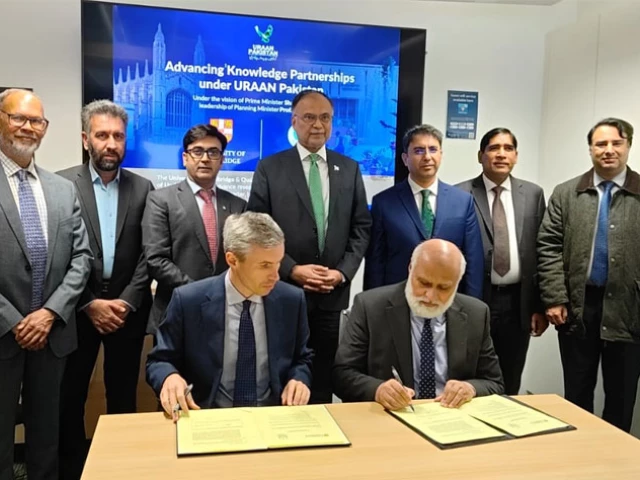Cambridge University in the United Kingdom and Quaid-i-Azam University (QAU), Islamabad, have signed a landmark memorandum of understanding (MoU) to promote collaboration in materials science and emerging technologies, a move aimed at strengthening Pakistan’s research capacity and international academic partnerships.
The agreement, signed in London, will support the launch of a Rs 3.5 billion joint initiative under the URAAN Pakistan PSDP to establish an Institute for Advanced Materials Sciences, the first collaboration of its kind between a Pakistani public sector university and Cambridge.
Planning Minister Ahsan Iqbal, present at the ceremony, described the partnership as a “historic step towards building Pakistan’s knowledge economy”. He said the collaboration would link Pakistani universities with international accelerators, venture funds and technology partners, strengthening links between academia and industry and promoting commercialization of research.
Read: Break free from inertia
The QAU-Cambridge partnership includes:
-
$0.7 million for faculty and student exchanges, joint research programs, and technology transfer pathways.
-
Focus on clean energy materials, aerospace composites, healthcare technologies, digital innovation and advanced manufacturing.
-
Commitment to launch the first exchange cohort, industry-backed protesters and a structured patent portfolio within 100 days, marking a leap towards a globally competitive and innovation-driven Pakistan.
Simultaneously, another MoU was signed between Cambridge Enterprise Ltd, UK, a subsidiary of Cambridge University, and Pakistan Institute of Development Economics (PIDE), Islamabad, aimed at strengthening Pakistan’s entrepreneurial and innovation ecosystem.
The partnerships reflect Pakistan’s drive to enhance research, innovation and technology commercialization while fostering international collaboration in cutting-edge scientific disciplines.
Read more: More than 80 Pakistani students win ‘Top in World’ award in Cambridge exams
Pakistan’s partnerships with institutions such as the University of Cambridge and Cambridge Enterprise Ltd come at a critical time, as the country faces stagnation in research, innovation and high-value industry.
Nadeem Javaid, PIDE Vice-Chancellor, has highlighted that Pakistan risks becoming trapped in the “middle-income trap”, where growth stagnates despite rising costs and ambition outstrips capacity.
Initiatives such as joint research programmes, faculty exchanges and technology transfer pathways aim to break this cycle by building human capital, fostering innovation and linking academia with industry – crucial steps in transforming Pakistan’s knowledge economy and creating a globally competitive and innovation-driven future.




